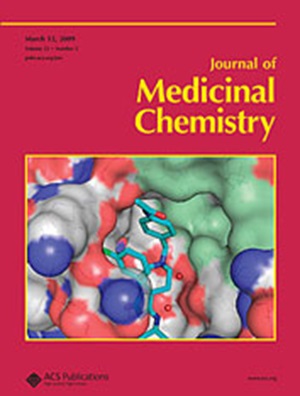Cyclic Peptide Therapeutic Agents Discovery: Computational and Artificial Intelligence-Driven Strategies
IF 6.8
1区 医学
Q1 CHEMISTRY, MEDICINAL
引用次数: 0
Abstract
Cyclic peptides have emerged as promising modulators of protein–protein interactions due to their unique pharmacological properties and ability to target extensive flat binding interfaces. However, traditional strategies for developing cyclic peptides are often hindered by significant resource constraints. Recent advancements in computational techniques and artificial intelligence-driven methodologies have significantly enhanced the cyclic peptide drug discovery pipeline, while breakthroughs in automated synthesis platforms have accelerated experimental validation, presenting transformative potential for pharmaceutical innovation. In this review, we examine state-of-the-art computational and artificial intelligence-driven strategies that address challenges such as peptide flexibility, limited data availability, and complex conformational landscapes. We discuss how the integration of physics-based simulations with deep learning techniques is redefining the design and optimization of cyclic peptide therapeutics and propose future perspectives to advance the precision and efficiency of cyclic peptide drug development, ultimately offering innovative solutions to unmet medical needs.

环状肽治疗剂的发现:计算和人工智能驱动的策略
由于其独特的药理特性和靶向广泛的平面结合界面的能力,环肽已成为蛋白质相互作用的有前途的调节剂。然而,开发环肽的传统策略往往受到资源限制的阻碍。计算技术和人工智能驱动方法的最新进展显著增强了环肽药物发现管道,而自动化合成平台的突破加速了实验验证,为制药创新提供了变革潜力。在这篇综述中,我们研究了最先进的计算和人工智能驱动的策略,这些策略解决了诸如肽灵活性、有限的数据可用性和复杂的构象景观等挑战。我们讨论了基于物理的模拟与深度学习技术的整合如何重新定义环肽疗法的设计和优化,并提出了未来的观点,以提高环肽药物开发的精度和效率,最终为未满足的医疗需求提供创新的解决方案。
本文章由计算机程序翻译,如有差异,请以英文原文为准。
求助全文
约1分钟内获得全文
求助全文
来源期刊

Journal of Medicinal Chemistry
医学-医药化学
CiteScore
4.00
自引率
11.00%
发文量
804
审稿时长
1.9 months
期刊介绍:
The Journal of Medicinal Chemistry is a prestigious biweekly peer-reviewed publication that focuses on the multifaceted field of medicinal chemistry. Since its inception in 1959 as the Journal of Medicinal and Pharmaceutical Chemistry, it has evolved to become a cornerstone in the dissemination of research findings related to the design, synthesis, and development of therapeutic agents.
The Journal of Medicinal Chemistry is recognized for its significant impact in the scientific community, as evidenced by its 2022 impact factor of 7.3. This metric reflects the journal's influence and the importance of its content in shaping the future of drug discovery and development. The journal serves as a vital resource for chemists, pharmacologists, and other researchers interested in the molecular mechanisms of drug action and the optimization of therapeutic compounds.
 求助内容:
求助内容: 应助结果提醒方式:
应助结果提醒方式:


